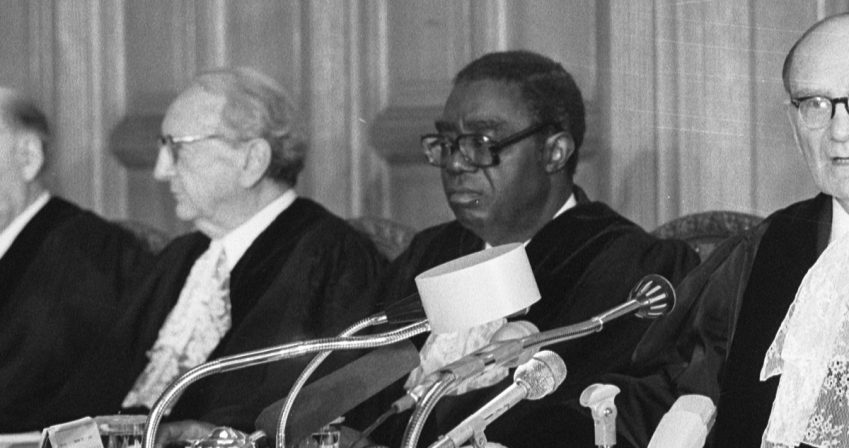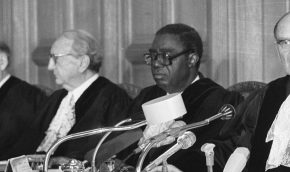Attorney-General and Chief Justice of Nigeria and a judge and President of the International Court of Justice
Celebrating Diversity at the Bar
- Introduction
- Diversity Timeline
- Edward Akufo-Addo
- Obafemi Awolowo
- Joyce Bamford-Addo
- Solomon Brandaranaike
- Charlotte Boaitey-Kwarteng
- Joseph Ephraim Casely Hayford
- Eugenia Charles
- S Chelvan
- Thomas Morris Chester
- Learie Constantine
- Edward Cragg Haynes
- Patricia Dangor
- Coomee Rustom Dantra
- Gifty Edila
- Ezlynn Deraniyagala
- Taslim Olawale Elias
- Martin Forde
- Arthur Dion Hanna
- Ma Pwa Hmee
- Alexander Isbiter
- Sibghatullah Kadri
- Seretse Kharma
- Moleleki Didwell Mokama
- Tunde Okewale
- Ashitey Ollennu
- Vallabhbhai Patel
- Lily Tie Ten Quee
- Ponnambalam Ramanathan
- Edward Richards
- Khushwant Singh
- Manjiit Singh Gill
- Teo Soon Kim
- Leslie Thomas
- Stella Thomas
- Leonard Woodley
Home › Celebrating Diversity at the Bar › Taslim Olawale Elias
Taslim Olawale Elias QC LLD CFR GCON
1914 - 1991
Call 1947, Inner Temple
Born on 11 November 1914 in Lagos, Nigeria, Taslim Olawale Elias was an Attorney-General and Chief Justice of Nigeria and a judge and President of the International Court of Justice. Before these achievements, Elias started his academic journey at the Church Missionary Society Grammar School and Igbobi College in Lagos.
In 1932, Elias married Ganiat Yetunde Fowosere, and they were blessed with five children.
In 1934, Elias worked as an assistant in the Government Audit Department. A year later, Elias joined the Nigerian Railway and served in the Chief Accountant's Office for nine years. While working for the Nigerian Railway, Elias passed his intermediate examination to study B.A and LLB at London University. In 1944 he started his academic studies at London University and completed his B.A and LLB in 1947. In 1947 Elias was called to the Bar by The Inner Temple and was awarded a Yarborough Anderson Scholar. Later in the same year, Elias received his LL.M degree in law from London University. Elias continued his studies and earned a doctorate in Law in 1949.
In 1951, Elias was awarded a United Nations Economic, Social and Cultural Organization (UNESCO) Fellowship to undertake research into Africa's legal, economic, and social problems. Elias later published his first book Nigerian Land Law and Custom.
In 1957, Elias was appointed the governor of the School of Oriental and African Studies, University of London. As the constitutional and legal adviser to the National Council of Nigeria and the Cameroons (which later became the National Convention of Nigerian Citizens), he participated in the 1958 Nigerian Constitutional Conference in London. He was one of the architects of Nigeria's independence constitution.


Taslim Olawale Elias QC LLD CFR GCON
After Nigerian's independence in 1960, Elias became the first Nigeria Attorney General and Minister of Justice, which ended in 1966 after the coup d'état. Later in 1966, Elias was appointed Professor and Dean of the Faculty of Law at Lagos University.
In 1967, Elias was appointed Nigeria's commissioner for justice and five years later, in 1972, became chief justice of the Supreme Court of Nigeria. Elias remained in this position until 1975, when the military took over. Later that year, he was elected by the General Assembly and the Security Council as a judge in the International Court of Justice (ICJ) that he served until his death on the 14 August 1991, aged 76.
Elias legacy lives on. For example, a classroom in the Faculty of Law at University Maastricht has been named after Elias.
Miriam Mbah